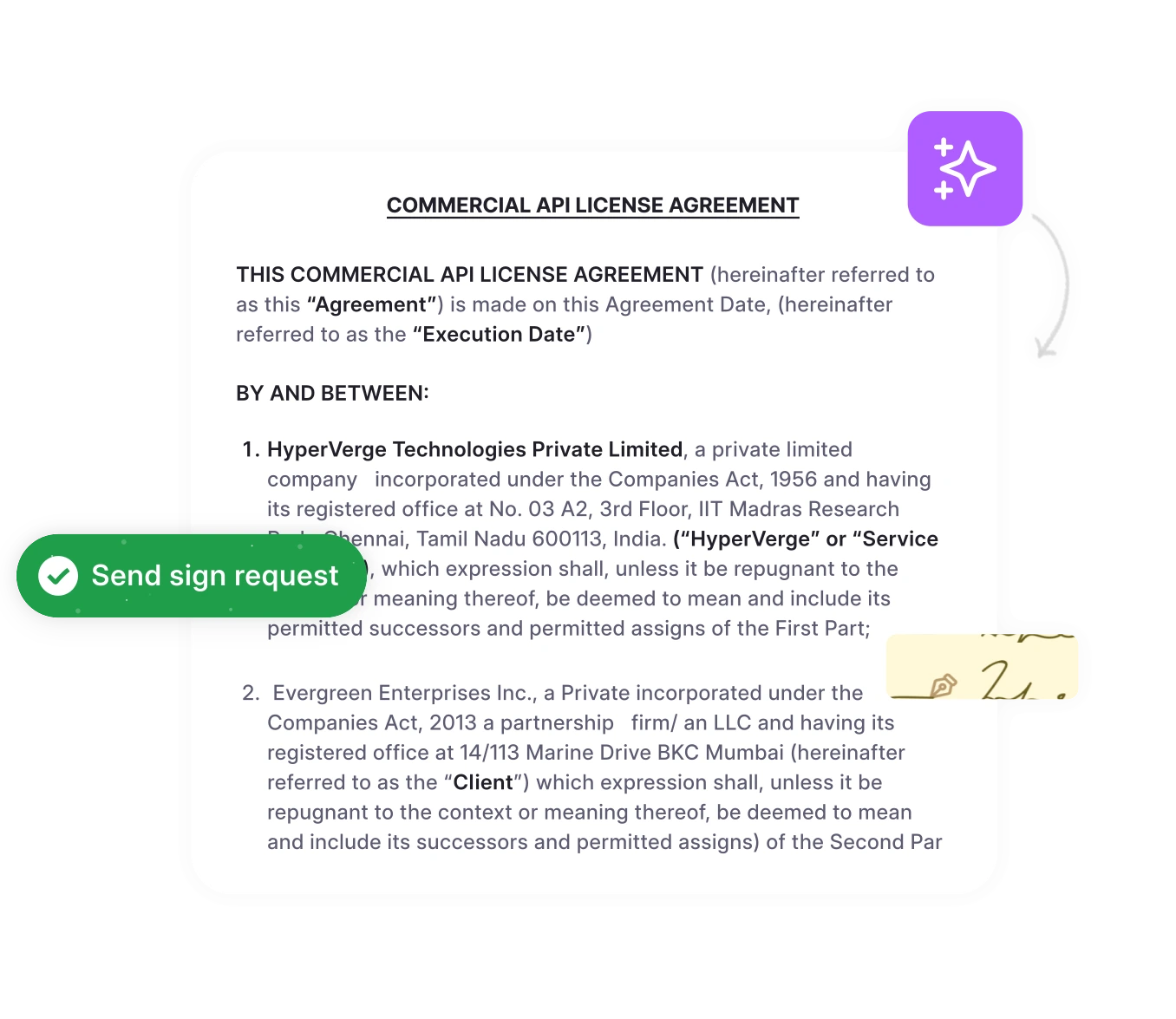Contracts can fail even before their scheduled performance dates, sometimes long before. When one party clearly signals they won’t fulfill their obligations, it creates a legal dilemma: Do you wait until the breach actually occurs, or can you act immediately? This situation is called an anticipatory breach, and it’s far more common in business than many realize. Understanding how to identify and respond to anticipatory breach signals can save your organization from missed deadlines, financial losses, and damaged relationships.
This comprehensive guide explains what an anticipatory breach means, the legal requirements that define it, provides practical examples across various industries, outlines the consequences you may face, and offers guidance on navigating breach of contract. According to the U.S. Courts, in 2024, federal district courts received 31,372 contract cases, including those involving anticipatory breach, insurance, and other commercial disputes.
We’ll also walk you through a step-by-step process for responding to breach signals and proven strategies for preventing them altogether. Whether you’re managing supplier contracts, service agreements, or real estate transactions, early identification of these breach signals is critical to protecting your business interests. Let’s start with the definition of an anticipatory breach.
What is anticipatory breach?
An anticipatory breach of contract occurs when one party clearly indicates, before the performance date arrives, that they will not fulfill their obligations. This can be expressed (a direct statement like “I won’t deliver”) or implied (selling the asset promised to someone else).
The key distinction from an actual breach is timing. With an anticipatory breach, the performance date has not yet arrived, but the intent not to perform is unambiguous. Both anticipatory breach and anticipatory repudiation describe the same legal concept.
When an anticipatory breach occurs, the non-breaching party can treat the contract as immediately broken, stop preparing for their own performance, and pursue damages without waiting for the due date. This flexibility exists because contract law recognizes that forcing someone to prepare for an obligation they know won’t be fulfilled serves no practical purpose.
Never miss an obligation.
HyperStart helps businesses automate contract monitoring and flag risk indicators in real time, so you catch breach signals before they become problems.
Book a DemoRequirements for an anticipatory breach
Not every delay, doubt, or statement qualifies as an anticipatory breach. Three specific legal requirements must be met for a party’s conduct to rise to the level of anticipatory breach:
| Requirement | Explanation | Example |
| Clear Refusal to Perform | The party must unambiguously communicate its intent not to perform. Vague statements, expressed doubts, or conditional language don’t qualify. | A supplier directly states: “Due to equipment failure, we cannot fulfill the order.” This is a clear refusal. A supplier saying “We may have delays” is not. |
| Before the Performance Due Date | The refusal must occur before the scheduled performance date has arrived. Once performance is due, a failure becomes an actual breach, not an anticipatory one. | A delivery contract specifies January 15. The supplier signals non-performance on January 10. This qualifies. If signaled on January 20, it’s a standard breach. |
| Definite and Unambiguous Intent | The party’s words or actions must leave no reasonable doubt about their intent. Courts examine the totality of circumstances to determine if intent is genuinely unambiguous. | A party sells the property they agreed to sell to another buyer, and this conduct definitively signals non-performance. Requesting a deadline extension is not an anticipatory breach. |
These three elements work together. A party can’t claim anticipatory breach based solely on a supplier’s operational struggles or temporary setbacks.
The refusal must be clear, it must come early, and the intent must be unmistakable. Understanding elements of a contract helps clarify these requirements, while recognizing when an enforceable contract is truly at risk distinguishes genuine breaches from normal performance challenges.
Examples of anticipatory breach in business contracts
Anticipatory breach appears across virtually every industry. Here are three realistic scenarios that illustrate how the concept plays out in actual business situations:
Example 1: Manufacturing & supplier contract
A technology company contracts with a semiconductor supplier contract management provider to deliver 10,000 chips by March 31. On March 10, a major fire destroyed the supplier’s production facility. The supplier’s operations manager emails the buyer: “Our facility is destroyed. We cannot manufacture or deliver any products for the next six months.” The buyer immediately treats this as an anticipatory breach, cancels the contract, finds an alternative supplier, and sues for the additional $50,000 cost difference.
Why this qualifies:
The supplier made a clear, unambiguous statement before the due date that they cannot perform.
Example 2: Real estate transaction
A homebuyer and seller execute a sales contract for a residential property scheduled to close on May 1. On April 15, the seller lists the same property for sale with another real estate agent and accepts a higher offer from a different buyer. The original buyer discovers this action and immediately terminates the contract as anticipatory breach, claiming damages for lost time and inspection costs.
Why this qualifies:
The seller’s conduct (accepting an alternative offer) definitively signals they cannot fulfill their original obligation, and this occurred before the closing date.
Example 3: Software services agreement
A SaaS company contracts with an enterprise client to implement a custom CRM system by December 1. On November 5, the vendor informed the client: “Our development team has been reassigned to higher-priority projects. We cannot meet the December 1 deadline and won’t have capacity for 90 days.” The client immediately suspends its own implementation efforts, hires a competing service agreement vendor, and sues for contract damages and additional development costs.
Why this qualifies:
The vendor provided definite notice before the performance date that they cannot deliver.
Consequences of an anticipatory breach
When anticipatory breach is established, several immediate and long-term consequences follow for both the breaching and non-breaching parties:
1. Suspension of your own performance obligations
The non-breaching party is excused from preparing for their performance. You don’t need to proceed as if the contract will be fulfilled.
2. Right to claim monetary damages
You can sue for all losses flowing from the anticipated breach: substitute procurement costs, lost profits, additional expenses, and related damages.
3. Right to specific performance
In some cases, courts can compel the breaching party to fulfill its obligations rather than simply paying damages.
4. Reputational and relationship consequences
An anticipatory breach often signals deeper operational or financial problems with the other party, potentially affecting future business relationships.
5. Option to terminate the contract immediately
You don’t need to wait for the performance date; you can end the agreement right away and move forward with alternatives.
6. Risk of litigation costs
While you have the right to sue, pursuing legal remedies requires investment in legal counsel, expert witnesses, and court proceedings.
The legal foundation for these rights is well-established in common law. As the landmark case illustrates:
The renunciation of a contract of future conduct by one party immediately dissolves the obligation of the other party to perform the contract, thus leaving no reason for requiring that the other wait till the day arrives before seeking his remedy by action.
Read
The above 170-year-old principle validates that you have the immediate right to act when an anticipatory breach occurs, without waiting for the performance date.
It’s essential to note that anticipatory breach and repudiation are closely related but distinct concepts. When a contract dispute arises from anticipatory breach, both terms enable the non-breaching party to treat the contract as broken.
The prevalence of these disputes in actual litigation underscores their importance. According to the Civilian Board of Contract Appeals (CBCA) Annual Report for 2024, 76% of the 165 Contract Disputes Act (CDA) appeals filed involved issues such as breach of contract, contract interpretation, and waiver, highlighting the prevalence and complexity of contract disputes, including anticipatory breach, in federal contracting.
Understanding the nuances between them protects your contractual relationship and helps you communicate clearly with legal counsel about your rights and options.
What are the remedies for anticipatory breach of contract
When anticipatory breach occurs, several legal and contractual remedies are available to recover losses and protect your interests:
| Remedy | Description | When to Use |
| Monetary Damages | Sue for direct losses (substitute procurement costs, lost profits) and consequential damages (related business impacts). Courts calculate damages based on the contract price, market rates, and actual losses incurred. | Most common remedy. Use when the breaching party has assets or insurance to satisfy a judgment. |
| Specific Performance | Obtain a court order compelling the breaching party to fulfill their contractual obligations rather than simply paying money. | When the contract involves unique goods, property, or services that cannot be easily replaced. Rarely awarded if monetary damages are sufficient. |
| Contract Cancellation | Terminate the agreement and recover losses already incurred (deposits, advance payments, preparation costs). You’re also freed from your own performance obligations. | Use when continuing the relationship is impossible or undesirable. Allows you to pursue alternatives without legal entanglement. |
| Indemnity Claims | If the contract includes an indemnity clause, you may recover losses under that provision. Indemnity agreements can cover breaches, third-party claims, and related damages. | Use when the contract specifically provides indemnification for breach scenarios. These clauses often streamline recovery. |
| Amendment or Renegotiation | Propose revised terms, extended timelines, or compromise arrangements rather than pursuing litigation. | When the business relationship has value and the breach was caused by a circumstance rather than deliberate action. Often faster and cheaper than litigation. |
Beyond these formal remedies, many contracts include provisions for alternative solutions. A contract amendment can sometimes be more efficient than pursuing damages, especially if the other party’s delay is temporary or can be rectified. Alternatively, specific indemnity agreement language streamlines recovery when a breach occurs.
How to respond to an anticipatory breach: Step-by-step guide
When you suspect anticipatory breach, a methodical response protects your legal rights and positions you for favorable remedies. Legal scholars have long recognized the importance of prompt action in these situations:
The wide acceptance of the doctrine is not difficult to understand, although specific justifications for the doctrine are more difficult to articulate than are the objections to it. One justification for allowing an immediate action in cases of an anticipatory repudiation is that such repudiation often causes instant injury to the repudiatee, which injury is different from that caused by actual non-performance.
Read
Because anticipatory breach causes immediate injury, these five steps will help you respond effectively:
1. Review Your Contract Thoroughly
Perform a detailed contract review of all terms, payment obligations, performance timelines, termination clauses, and dispute resolution provisions. Many companies overlook critical details about arbitration requirements or damage limitations before taking action.
2. Document the Breach Signal
Record every communication indicating the other party’s intent not to perform: emails, meeting notes, recorded calls (if legal in your jurisdiction), and written statements. Document dates, times, and exact language, then compile this evidence as your foundation if the dispute escalates to litigation.
3. Communicate Your Position Strategically
Send a formal written notice acknowledging the breach signal and stating your position professionally. Reference specific contract clauses and clearly state what remedies you’re seeking, avoiding accusatory language that might escalate the situation unnecessarily.
4. Consult Legal Counsel
Before formal claims or litigation, discuss your situation with an attorney specializing in legal document review and contract law. Your counsel will evaluate claim strength, estimate damages, discuss settlement strategies, and advise on jurisdiction and litigation costs.
5. Decide on Immediate Action Based on Your Business Priorities
You now have several paths: pursue damages through litigation, negotiate revised terms, find alternatives, or wait for clarification. Your decision depends on contract value, timeline, claim strength, and whether maintaining the relationship matters long-term.
Stay ahead of contract obligations.
Our platform tracks performance obligations and helps identify breach risks early, so you can act before damages accumulate.
Book a DemoHow to prevent anticipatory breaches in business contracts?
The most cost-effective approach to anticipatory breach is prevention. By implementing these strategies, you dramatically reduce the likelihood of pre-performance breach signals:
1. Draft clear, enforceable contracts with specific performance clauses
Vague or ambiguous terms invite disputes. Clear performance standards, delivery dates, quality specifications, and acceptance criteria reduce misunderstandings and breach signals. Contract drafting that emphasizes precision prevents future conflicts.
2. Include adequate assurance and termination provisions
Build clauses that require parties to provide periodic updates on their performance readiness, financial stability, or resource availability. Include termination-for-convenience clauses so parties can exit if circumstances change dramatically.
3. Monitor compliance and performance continuously
Don’t wait until the performance date to check in. Schedule regular status meetings, request milestone updates, and verify that key parties remain committed to performance. Contract monitoring identifies potential breaches before they escalate into crises.
4. Use automated alerts to identify delays or intent changes
Modern contract management systems flag upcoming deadlines, track milestone completion, and alert you when expected communications or updates fail to arrive on time. Contract performance management tools automate this vigilance.
5. Build supplier and partner diversification
Over-dependence on a single supplier creates vulnerability. When one party signals breach, diversified relationships provide immediate alternatives without disrupting your operations.
6. Include specific remedies and dispute resolution processes
Contracts with clear remedies, mediation requirements, and arbitration procedures enable faster resolution than litigation and often preserve business relationships.
Safeguard your contracts with HyperStart
Anticipatory breach is a reality in modern business contracting. Understanding how to recognize breach signals before performance dates arrive separates organizations that minimize damage from those that suffer massive losses.
Early identification is critical. When you detect an anticipatory breach signal, you gain the immediate right to act without waiting for an actual breach to occur. This saves preparation costs, allows you to find alternatives quickly, and positions you to recover damages. Yet early detection requires continuous vigilance: monitor performance signals, maintain documentation, and watch for subtle changes in communication.
HyperStart, a contract management platform, automatically tracks performance obligations against scheduled dates and alerts you to potential breach risks in real time. By combining clear contract management automation, proactive monitoring, and automated breach detection, you transform anticipatory breach from a costly surprise into a manageable risk.











